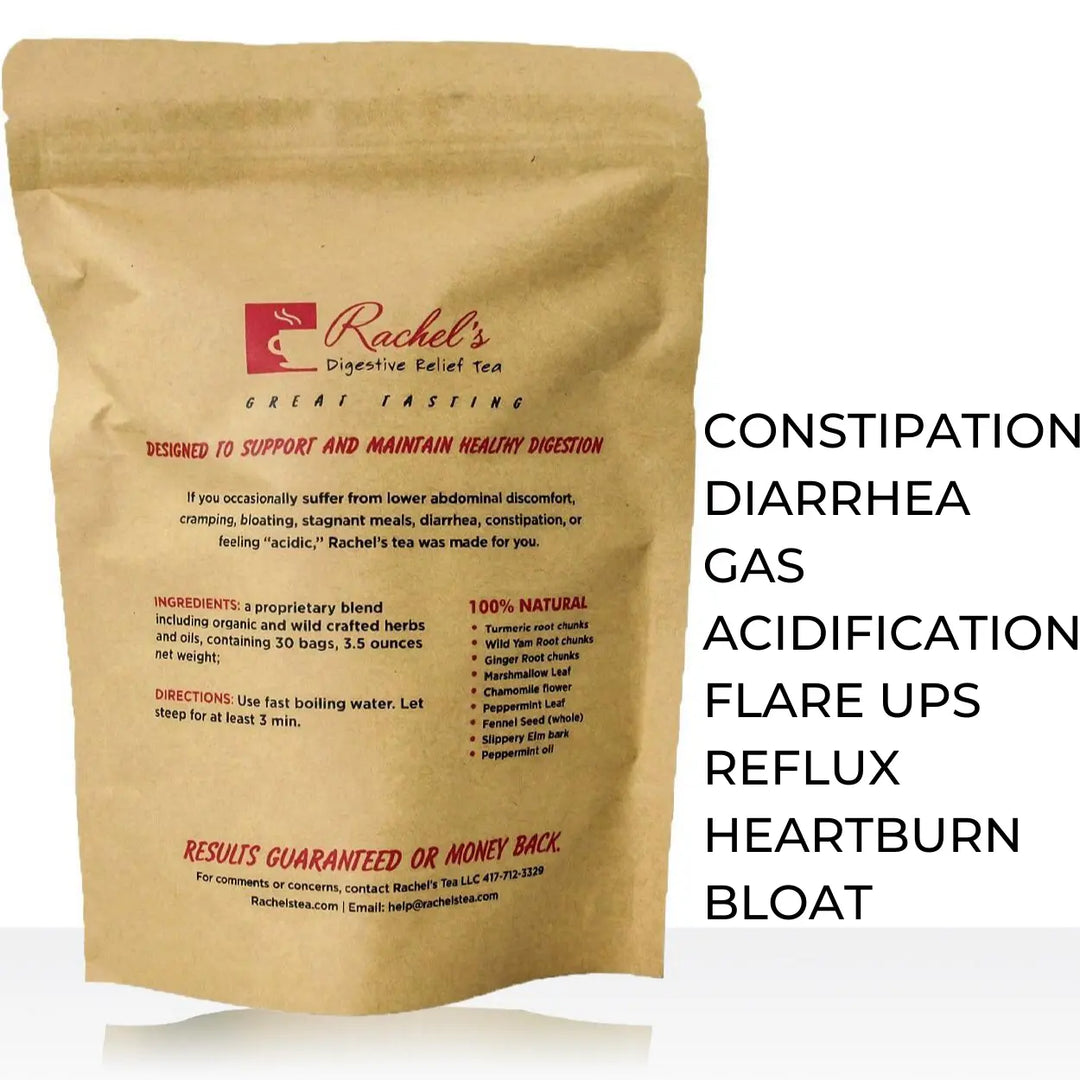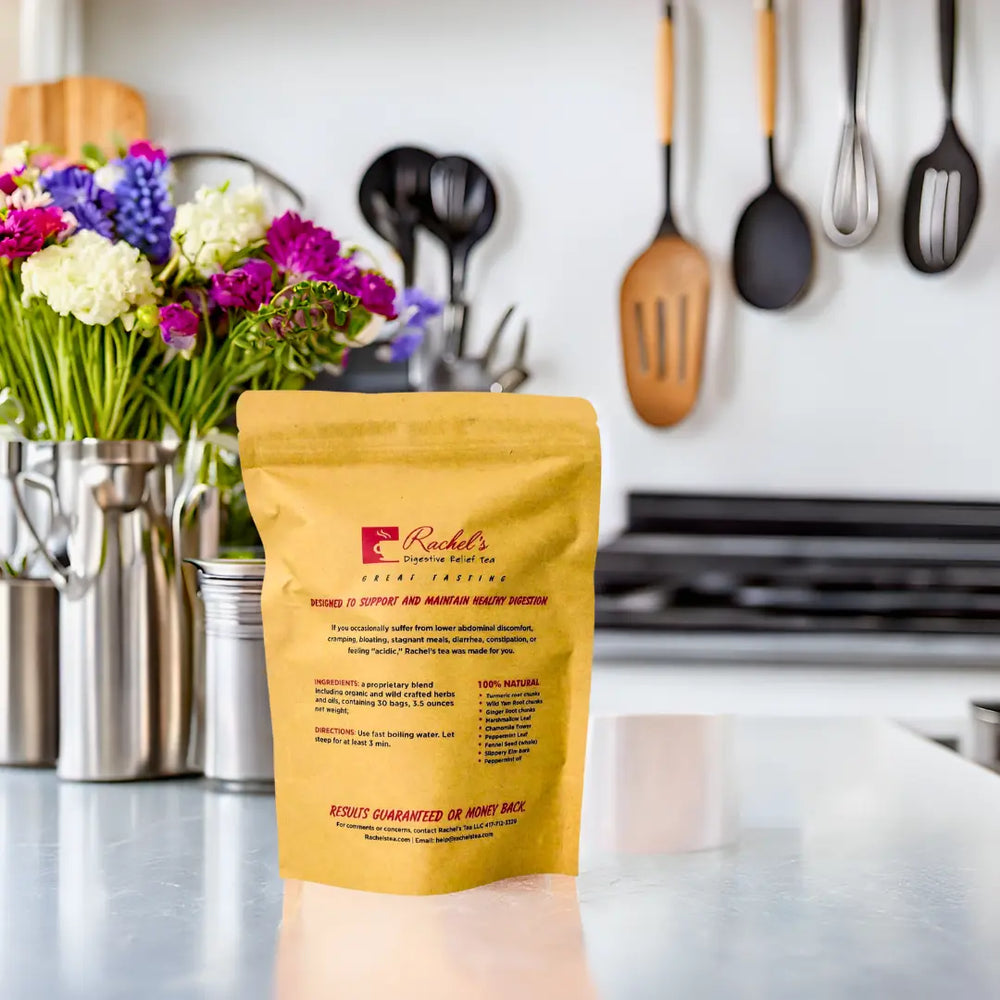How does tea help a digestive problem?

People who experience digestive discomfort like bloating, nausea, constipation or diarrhea are very common these days. But digestive tea is a natural and effective solution to soothe your digestive system. Today, I will tell you about its herbal ingredients, how it works best for your gut health and why Rachel’s digestive tea is more convenient and the best ready-made option for you.
What are the best herbal ingredients for digestive health?

Best ingredients make the best tea for digestion. Some herbs and plants have been used for centuries to support digestion and alleviate discomfort. The list of most commonly used ingredients in digestive relief teas is as follows:
-
Peppermint leaf & peppermint oil soothe the digestive tract. It relieves gas, bloating, and indigestion. People use peppermint oil for bloating and IBS.
-
Turmeric root is a powerful anti-inflammatory herb. It reduces gut inflammation and promotes digestive health.
-
Slippery elm bark has mucilage. This mucilage soothes and protects the damaged digestive tissues. All you to know about slippery elm is, it takes digestive tea to another level.
-
Wild yam root regulates the digestive process. It reduces discomfort.
-
Marshmallow root soothes inflammation and promotes healthy digestion. It also protects the stomach lining.
-
Chamomile flowers have calming properties. It reduces stomach cramps and discomfort making it a comfort tea.
-
Ginger root is a natural anti-nausea herb. It promotes digestion and reduces bloating.
-
Fennel seed relief of gas and bloating. It also supports digestive functions.
To get into more details about its ingredients, you can read What Is in Digestive Tea for Constipation and Bloating?
Why These Ingredients Matter for Digestive Health
These herbs have specific benefits for the digestive system that makes it best tea for gut health which include:
-
Support for damaged tissue: Slippery elm and marshmallow root repair and soothe the damaged tissues in the digestive tract.
-
Digestive valve support: Peppermint and chamomile helps to relax digestive muscles and promote healthy digestion.
-
Anti-inflammatory effects: Turmeric and ginger have anti-inflammatory properties. They help to reduce swelling and irritation in the gut.
-
Natural relief from gas: Fennel seeds and peppermint provide natural relief from bloating, gas, and indigestion.
If you want to know more about how it help digestive issues, then read How Digestive Tea Can Help With IBS, Bloating & Gut Health.
Why Tea Is a Better Option for Digestive Health
When it comes to treating digestive problems, digestive tea has more advantages over other remedies and medicines. No doubt medication is necessary in some severe cases. But gut health tea provides a more natural and gentle solution for digestive discomfort. Here’s why:

1.Direct application to the digestive system:
Synthetic drugs are absorbed into the bloodstream. However, the active compounds in tea for digestion directly target the digestive system.
2. Avoiding systemic side effects:
Many pharmaceutical medications, like ibuprofen, can irritate the digestive system. Because they pass through the stomach and intestines. This calming tea directly goes to the affected area. It reduces the risk of possible side effects and damage to the gut.
3.Gentle yet effective:
Pharmaceutical drugs contain powerful chemicals that go into the bloodstream. Herbal teas work more gently and support the digestive system. This makes it the best tea for gut health.
I have an example here. If you hit your thumb with a hammer and you want to use ibuprofen for pain and swelling relief. If you take 100 milligrams of the drug. Perhaps 1/10th of 1% of the drug reaches the swollen thumb. Ibuprofen is a digestive irritant so it irritates the stomach and intestines as it is absorbed into the bloodstream. It is not a direct application to inflammation or injury. It only works via the bloodstream.
Now compare this to tea. Saponins and terpenes in tea herbs work via the bloodstream and direct contact. As you drink tea, instead of further irritating and damaging an already weak digestive system. Tea applies the saponins and terpenes directly to inflamed, irritated, damaged, scarred, and even ulcerated tissue. Do you see the difference and the unbelievable advantages tea has? Some people are of the point of view, that digestive disorders run in families. But it is not true.
Rachel’s Digestive Tea: A Unique Solution
Rachel’s Digestive Tea is a standout option for people who are looking for a simple and ready-made solution. It is made with a carefully selected blend of herbs. Its powerful herbal blend offers digestive support. You can purchase it from Rachel’s Tea online store. This tea promotes healthy digestion, reduces bloating, and supports gut health.
Related posts
- Best Digestive Teas for Bloating, Indigestion, and Gut Health
- Best Tea for Stomach Pain and Bloating
Disclaimer
We are not doctors, nor are these facts reviewed by the FDA or doctors. We are presenting our theories and experience to show you what has worked for us and others using our strategies. Your condition is not known to us and you should not follow us if in doing so you are avoiding medical advice or treatment.












